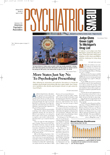Who is the man who, at the forthcoming APA annual meeting, will be discussing Gershwin’s mental states and playing some of Gershwin’s compositions that reflect those states?
His name is Richard Kogan, M.D., and his life story is almost as intriguing as that of Gershwin himself.
Kogan’s mother, a former music teacher, recognized his musical talent and perfect pitch when he was only 4 years old and got him started on piano lessons. He studied piano at the Juilliard School, one of the most prestigious music schools in the world, from ages 6 to 18.
But music wasn’t the only influence in young Kogan’s life. His father was a gastroenterologist and took Kogan with him on medical rounds. Because of this exposure, and for other reasons, Kogan decided to attend Harvard College rather than a music conservatory, where the focus would have been almost exclusively on music. And, after that, Kogan decided to go to Harvard Medical School and become a physician.
Yet during his college and medical school years, Kogan also continued to develop as a musician. The dean of Harvard Medical School created a special five-year schedule for him allowing him to travel and play concerts between medical clerkships. He won first prize in a Chopin Competition of the Kosciuszko Foundation while he was still a college undergraduate, followed by the Concert Artists Guild Award and Portland Symphony National Piano Competition.
Today Kogan is both a psychiatrist and a professional musician. He has a private practice in New York City, serves as director of the Human Sexuality Program at New York Presbyterian–Weill Cornell Medical Center, and gives piano concerts and lecture-piano performances throughout the world. The New York Times has described him as a “superb musician” whose playing is “eloquent and compelling.”
And it is precisely because of his two professions that Kogan is fascinated by the interplay between mental illness and musical creativity. Is it possible to be musically creative without being mentally ill?
“Yes it is,” Kogan told Psychiatric News. “Bach, Haydn, and Mendelssohn are three examples. In contrast, there has been a greater percentage of mental illness in great composers than in the general population. So I am convinced that there is a profound link between mental illness and musical creativity.”
This is not APA’s first annual meeting at which Kogan has hosted a forum on a great composer and how his mind influenced his music. At last year’s annual meeting, Kogan held a forum on Tchaikovsky, and at the 2001 annual meeting, one on Schumann.
Also, during this past year, Kogan gave lecture-piano performances for the Maryland Psychiatric Society, the Massachusetts Psychiatric Society, and the Cleveland Psychoanalytic Society. He likewise did a benefit lecture and concert for the National Alliance for the Mentally Ill (NAMI) in New Jersey and will be doing another one soon for NAMI in Ohio.
